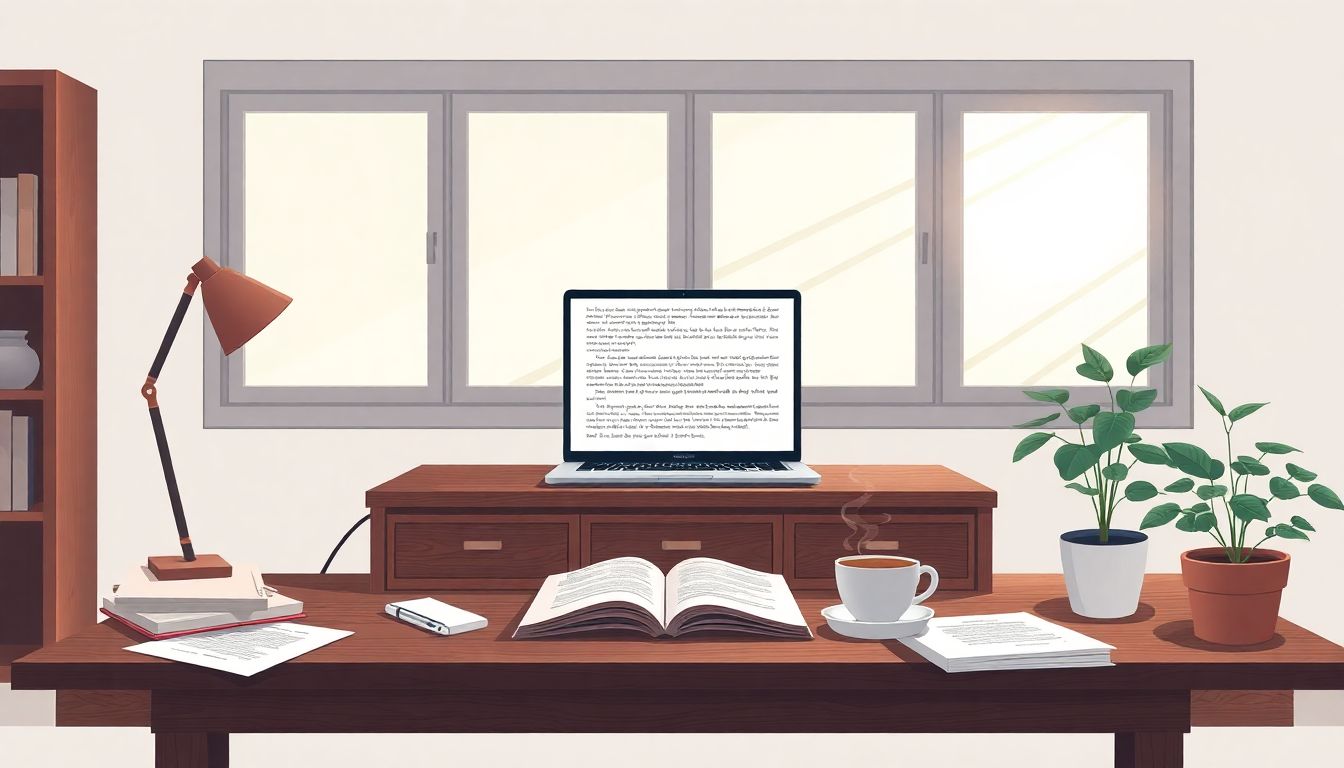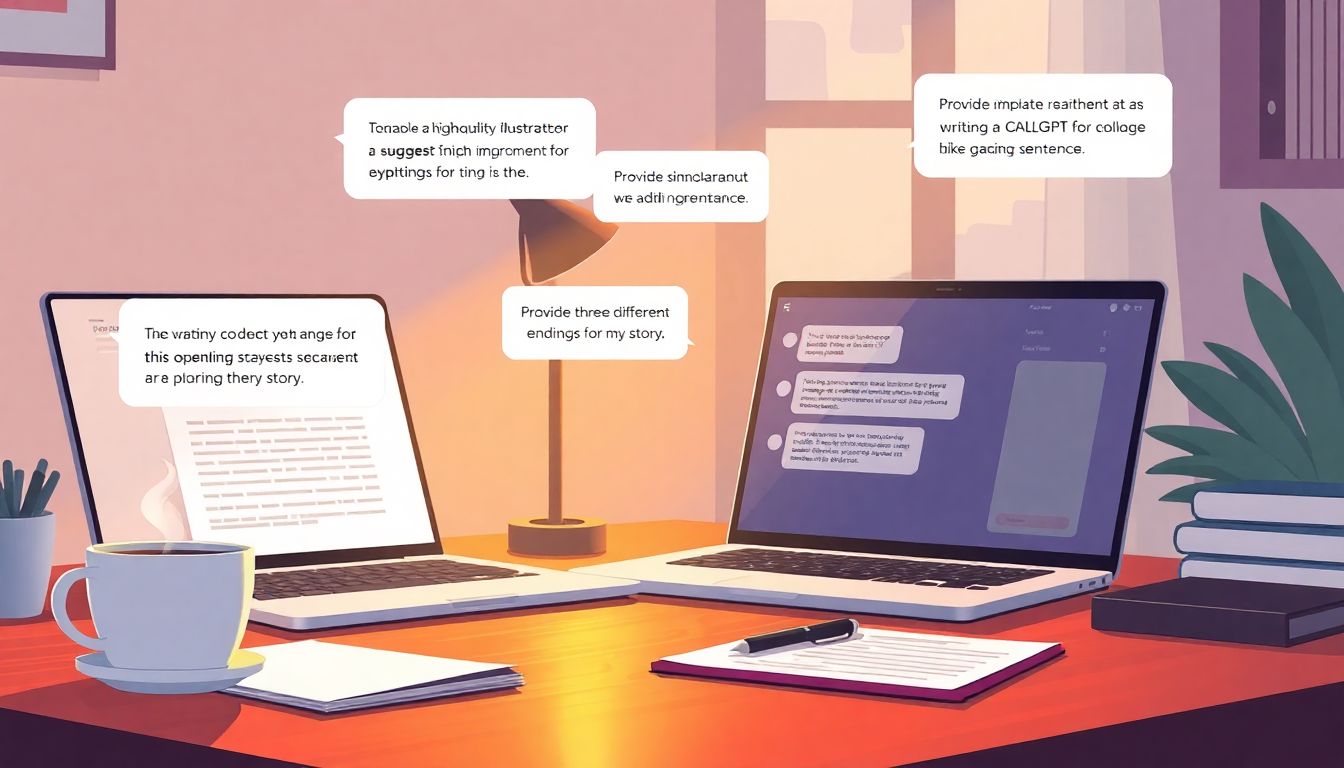Feeling stuck with writer’s block can be incredibly frustrating. You might find yourself staring at a blank page for what feels like hours, wishing for the words to just flow. Trust me, you’re not alone—many writers face this challenge, and it can be downright maddening.
But guess what? There’s hope! If you stick around, I’ll show you how ChatGPT can become your trusty sidekick in overcoming these pesky blockades. With a few clever techniques, you can unleash your creativity and get back to writing without losing your mind.
We’ll dive into common causes of writer’s block, explore how to generate fresh ideas, and even craft prompts to jumpstart your creativity. Plus, you’ll discover success stories and tips on making the most of ChatGPT in your writing journey. Ready? Let’s get started!
Key Takeaways
- ChatGPT can help break through writer’s block by providing fresh ideas, prompts, and constructive feedback.
- Identify the common causes of your writer’s block, such as fear of criticism or lack of inspiration, to address them effectively.
- Use specific prompts with ChatGPT to generate content ideas and brainstorm creatively.
- Craft clear and engaging prompts to get the best responses from ChatGPT and stimulate your creativity.
- Ask ChatGPT for feedback on your writing to identify areas for improvement and gain confidence.
- Establish a writing routine with ChatGPT’s help to stay organized and focused on your projects.
- Many writers have successfully overcome blocks and boosted their output using ChatGPT as a supportive tool.

How ChatGPT Can Help You Overcome Writer’s Block
Writer’s block can be frustrating and often leaves you staring at a blank page, but ChatGPT can change that.
This AI writing tool serves as a digital brainstorming partner, here to help you break through those creative barriers.
By providing fresh ideas, engaging prompts, and constructive feedback, ChatGPT can enhance your creativity and boost your productivity.
Think of it as having a reliable friend who’s always ready to chat about your writing challenges.
Common Causes of Writer’s Block
Understanding the root causes of writer’s block is the first step to overcoming it.
Many writers experience mental barriers such as fear of criticism or perfectionism that stifle their creativity.
A lack of inspiration can also play a significant role, making it difficult to even start writing.
If you find yourself stuck, take a moment to identify which of these barriers is holding you back.
Once you recognize the source, you can use tools like ChatGPT to address each specific issue.
Using ChatGPT for Idea Generation
When you’re out of ideas, ChatGPT can be your lifesaver for spontaneous brainstorming.
Try asking it specific questions or giving it themes to generate new content ideas.
Here are some prompt examples to get you started:
- “Give me 10 unique blog post ideas about [your topic].”
- “List some creative writing prompts based on [a theme you like].”
- “What could happen if [character name] faced [specific situation]?”
- “Generate a list of potential storylines for a novel about [genre or theme].”
With these kinds of prompts, you’ll be surprised at the sheer volume of inspiration that can flow from ChatGPT!
Crafting Prompts to Spark Creativity
The key to getting the most out of ChatGPT is crafting effective prompts.
Engaging and clear prompts can significantly influence the quality of the responses you receive.
Consider using these strategies when crafting your prompts:
- Be specific: “Help me create a dystopian world where technology rules over humanity” is better than “Give me world-building ideas.”
- Ask for multiple options: “Provide five character ideas for a fantasy novel” encourages variety.
- Encourage exploration: “What if [situation] happened in a completely different setting?” can lead to unique scenarios.
Using these techniques can help stimulate your creativity and push past those mental blocks.

Getting Feedback on Your Writing with ChatGPT
Receiving feedback can be a game-changer for writers looking to improve their work.
ChatGPT can provide constructive criticism on your writing, helping you spot areas for improvement.
To make the most of this feature, follow these prompts:
- “Review my paragraph about [topic] and suggest improvements.”
- “Identify any grammatical errors in this text: [insert text].”
- “How can I make this piece more engaging? [insert text].”
- “What are three strengths and three weaknesses in the following story: [insert story].”
By applying these prompts, you can refine your writing and gain valuable insights into your style and structure.
Setting Up a Writing Routine with ChatGPT’s Assistance
A consistent writing routine is crucial for overcoming writer’s block.
ChatGPT can help you establish and adhere to a writing schedule that works for you.
Start with these prompts to get organized:
- “Create a daily writing schedule for me that includes [number of days] and [time of day].”
- “Suggest a writing goal for each day of the week to achieve [desired word count or project level].”
- “Help me design a writing checklist that ensures I cover all necessary elements in my writing.”
- “What are some effective strategies for avoiding distractions while writing?”
With these strategies in place, you’ll find it easier to keep up the momentum and stay focused on your writing projects.
Examples of ChatGPT Prompts for Writer’s Block
If you’re struggling with writer’s block, specific prompts can set your creativity into motion.
Here’s a list of prompts you can use directly with ChatGPT:
- “Generate a short story idea based on the following three words: [word1], [word2], [word3].”
- “Write an opening paragraph for a thriller novel featuring a character named [character name].”
- “List five potential conflicts for a romantic comedy that takes place in a bakery.”
- “Provide character backstories for the main characters in a [genre] story.”
- “Craft a dialogue snippet between two friends discussing [specific topic].”
These prompts can ignite your imagination and help you break through any creative barriers you might be facing.
Success Stories: Writers Who Overcame Blocks with ChatGPT
Many writers have successfully used ChatGPT to navigate writer’s block.
For instance, one blogger reported that generating new ideas with ChatGPT led to a month of daily posts without burnout.
Another author used ChatGPT for feedback, which improved their editing process and boosted their confidence.
Looking at these success stories can motivate you to harness the power of ChatGPT in your own writing journey.

Tips for Making the Most of ChatGPT in Your Writing
Getting the best out of ChatGPT is all about using it intelligently.
First, always keep your questions clear and specific to get the most relevant answers.
For example, instead of asking, “What should I write about?” try, “Provide three article ideas for a tech blog focused on AI developments.”
Don’t hesitate to ask follow-up questions to dive deeper into a topic after receiving initial answers.
You can also refine and customize responses by asking ChatGPT to revise its suggestions or expand on particular points.
Here’s a practical set of prompts to help you maximize ChatGPT’s capabilities:
- “Summarize the key themes in my writing: [insert text].”
- “Suggest improvements for this opening sentence: [insert sentence].”
- “Generate a list of questions I should answer in my article about [topic].”
- “Provide three different endings for my story: [insert brief summary].”
Staying open to experimenting with prompts will help you make the most of this tool.
Also, share your experiences and learn from your interactions with ChatGPT to refine future queries.
Lastly, consider integrating a mix of tech and human elements in your writing; use ChatGPT for drafts and personal touches to convey your unique voice.
FAQs
Writer’s Block is a common condition where writers struggle to create content. ChatGPT can help by providing prompts, generating ideas, and facilitating discussions to reignite creativity and push through mental barriers.
You can use ChatGPT by inputting specific topics or themes, asking it to present ideas, or providing it with writing genres. This encourages diverse brainstorming and can lead to unexpected and fresh concepts.
Effective prompts are specific and open-ended, such as “Describe a day in the life of a time traveler” or “What if animals could talk?” Tailor prompts to your writing style to stimulate imaginative responses.
Yes, ChatGPT can analyze your writing and offer constructive feedback on clarity, style, and grammar. It can also suggest improvements, making it a valuable tool for refining your work before finalizing it.
